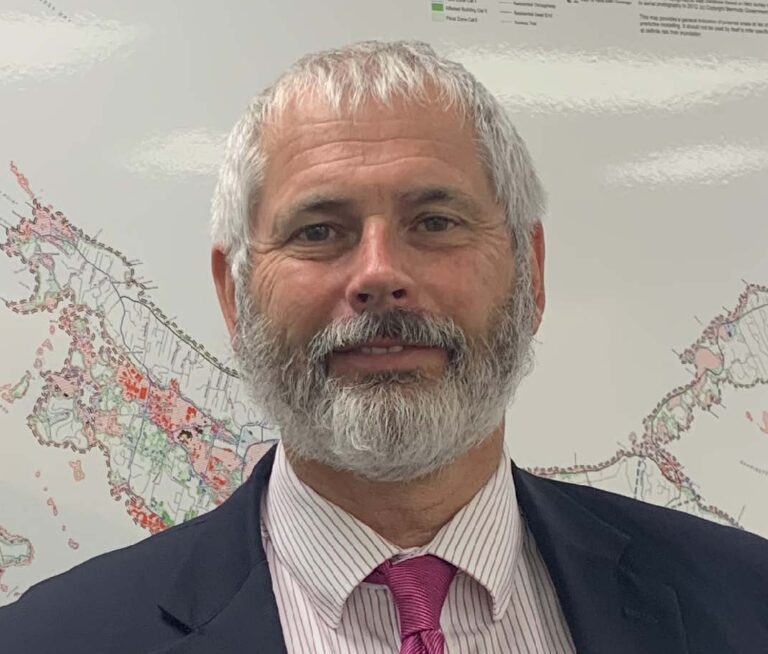by Tim SMITH
The homeless population is more vulnerable than anyone else when a hurricane approaches and an all-hands-on-deck approach is required to ensure their safety.
About 50 people are estimated to sleep rough in Bermuda on a regular basis, with many more living in insecure housing. Many of these find temporary shelter with families in the hours before, during and after a major storm, while charities, churches and the Bermuda government all play a part in ensuring everyone is kept safe.
In recent years, The Salvation Army complex has not been deemed a suitable accommodation during a hurricane, so the emergency shelter at CedarBridge Academy has typically catered to about 60 people during a storm. But as the homeless population has continued to grow in the wake of the Covid-19 pandemic, services providing shelter have upped their game.
The charity Home aims to provide shelter for 24 people at its facility at Boaz Island, while The Salvation Army will be able to accommodate 60 at its new premises being created on North Street.
Steve Cosham, Bermuda’s national disaster coordinator, hopes this will mean fewer people need the CedarBridge shelter. “Unsheltered people have traditionally only had available The Salvation Army emergency housing facility located at North Street,” Cosham says. “During Covid-19, their capacity to house was reduced from about 40 people to 24 people. There was never enough to house all those people that looked for housing from The Salvation Army.”
He explains that the government granted The Salvation Army a large sum and work is ongoing to build the new facility at North Street. This is a great stride forward. “We also know that Covid-19 has increased the population without shelter. If we see a hurricane this year, The Salvation Army and Home will take 84 people, which is fantastic.”
Cosham says nobody knows how many people will show up at the shelter at CedarBridge Academy’s gymnasium, but they are not expecting as many as in previous years.
The CedarBridge shelter is advertised across the media in advance of a storm and opens 12 hours before the hurricane is forecast to arrive, but Cosham notes: “There is no power to order people to use it.”
The Salvation Army plays a key role in ensuring people take advantage of the shelter. Business manager Chandra-Lee Bascome says: “A lot of homeless people are able to get shelter with their families for the storm even if they can’t stay with them permanently. We work to get the other people into the shelter. We are already going around to the known locations to provide people with soup anyway. When it comes to a hurricane, we look out for those who haven’t moved to the emergency housing complex and take them up to CedarBridge.”
Bascome explains that Maxwell Assing, their street ministry driver, knows where to find homeless people and says he has a critically important relationship with them. “Maxwell knows his people out there and knows who he needs to look for. The people are also trusting of him so will listen to his advice.”
At CedarBridge, beds are set up in the gymnasium, family rooms are provided and measures are made to cater to those with special medical needs or who are oxygen dependent. The Department of Child and Family Services staffs the operation, assisted by voluntary organizations such as The Bermuda Red Cross, churches, St. John Ambulance and the Royal Bermuda Regiment. Private security is provided because many in the homeless community have stated they would not be comfortable with a police presence.
Food is supplied by The Salvation Army and Cosham adds: “There is Wi-Fi at the shelter and the Red Cross donates games to keep people happy. The Red Cross also takes up a large supply of clothes to allow the unsheltered to change clothes where needed.”
The shelter stays open until after the Emergency Measures Organization confirms it’s safe to go back outside. Bascome says The Salvation Army is looking forward to being able to accommodate people at the new North Street complex, which features refurbished shipping containers, fortified by the Bermuda Housing Corporation to ensure they are hurricane-proof.
“At the moment our complex isn’t suitable during a hurricane, so all our clients have to go up to the emergency shelter,” she says. “With our new complex, our people should be able to remain at the emergency complex. Everybody wants to be in their own place during a hurricane, where they can protect their own belongings no matter what may come. I don’t want to leave my belongings behind and I’m sure they all feel the same.”
Cosham suggests more shelters could be set up across the island in the future. “There are discussions in place to have more shelters, utilizing the churches, so we have them at more locations around the island,” he says. “At present, the demand is just for CedarBridge. If we saw a bigger demand, then we would look at opening more shelters.”
Bascome pays tribute to the volunteers who step up and reminds the public that we all have a part to play in helping our fellow brothers and sisters. “We have some families who have volunteered in this role for years,” she says. “Some of those people get lead roles in planning the menu for three or four days. We are very grateful for their help.”
She says she always finds that those who have experienced hardship themselves tend to be the more compassionate and generous. “I would ask the general public to consider the possibility that it could happen to any of you. None of us knows what the future might hold.”
She says the everyday person came for support during the pandemic when pretty much everyone had stopped working.

